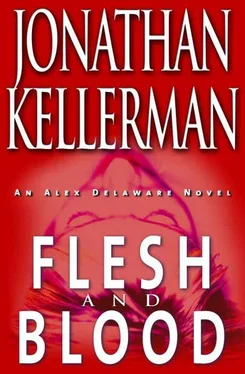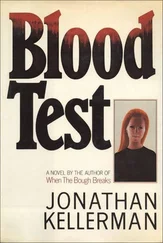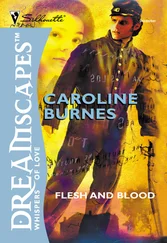“Lauren told Salander she went to Malibu for rest and recreation. Is the phone near a motel?”
“No. Shopping center at Kanan-Dume Road.”
“Have you found any cell phone account for her, or an answering service?”
“Not so far.”
“Don’t you find that surprising, if she was making dates?”
Pause. “A bit.”
“Unless,” I said, “she didn’t need a service because she wasn’t casting her net. Had one client who paid all the bills. Maybe someone who lives in Malibu, doesn’t want wifey-poo to hear Lauren’s call, so he uses the pay phone.”
“Fifty grand plus from one john? One helluva habit.”
“Lots of passion,” I said. “When those kinds of things go bad, they go very bad.”
“I’ll drive there today, see what kinds of shops are nearby – maybe someone noticed something. Maybe I’ll drop in on de Maartens on the way back. Where’s he live?”
“Don’t know, but his number’s a 310.”
“I’ll get it. Thanks for all the work, Alex.”
“However useless.”
“Hey,” he said, “you can never tell what’ll pan out.”
Lying through his teeth. What else are friends for?
Just after one P.M. I got in the Seville and drove to Motivational Associates’ Brentwood office.
The building was one of a group of towers that had sprouted on Wilshire during one of the booms. Four stories for parking, eight for offices, zebra-striped walls of white aluminum and black glass. The packing carton a serious building came in.
I walked past an empty guard desk to the directory. No pattern to the tenant mix: computer consultants, insurance agents, lawyers, an occupational therapy brokerage, a few psychotherapists. Motivational Associates was Suite 717, a third of the way down a gray-walled, plum-carpeted hallway. Black doors with tiny chrome signage. Dugger’s was set between E-WISDOM and THE LAW OFFICES OF NORMAN AND REBBIRQUE.
No mail at or under the door, and when I peeked through the slot I saw an unlit waiting room, still no pile of letters. Either someone had collected or the post went to another location. I didn’t knock – the last thing I wanted was to have to explain myself.
I’d returned to the elevator, was waiting for it to ascend from the lobby when the door to 717 swung open and a man came out carrying a scuffed brown leather briefcase. Locking the dead bolt, he made his way in my direction, swinging his keys.
Thirty-five to forty, five-ten, one sixty. Dark hair trimmed close to the sides, thinning on top, freckled bald spot at the crown. He wore a shapeless oatmeal herringbone sport coat with brown-leather elbow patches, an open-necked white button-down shirt with blue stripes, faded beige cords that would’ve suited Milo had they been five waist sizes larger, and brown loafers with toes worn to gray gristle. A wadded selection from the morning’s Times was stuffed into a pocket of the jacket, weighing the garment down on one side and making him appear lopsided. Three black plastic pens were clipped to his handkerchief pocket. Tortoiseshell eyeglasses dangled from a chain around his neck.
He arrived at the lift just as the door opened, waited for me to step in, then followed and stood near the door. Placing the briefcase on the floor, he punched in P3 and said, “How about you?” in a pleasant voice. Straight nose, straight mouth, smallish ears, firm chin. Nothing out of proportion, but something – a blurring of contours – kept it just shy of handsome. The lapel of his sport coat was fuzzed where it met his shirt. Two white threads had come loose from his shirt collar.
I said, “Same, thanks.”
He turned, offering a view of his bald spot. I noticed a worn gold monogram above the clasp of the case. BJD. As we descended he began whistling, and his hands grew active – fingers drumming, tapping, stretching, curling. A shaving nick bottomed his right earlobe. Another cut flecked his jawline. He gave off the smell of soap and water.
He stopped whistling. Said, “Sorry.”
“No problem.”
“They used to play Muzak. Someone must’ve complained.”
“People tend to do that.”
“They do, indeed.”
No further exchange until we reached P3 and I hung back as he stepped out into the parking area. As he headed briskly toward a nearby aisle, I was watching from behind a concrete pillar.
His car was a white Volvo sedan, plain-wrap model, several years old. No alarm click, and he’d left the door unlocked. Tossing the briefcase across the seat, he slid in, started up, backed out blowing chalky smoke. I ran up the three flights to the lobby, was heading for the Seville when I saw him pull onto Wilshire, going west.
Toward the beach? Malibu?
He was ten blocks ahead of me, and it took several traffic violations for me to catch up. I stayed two car lengths behind in the neighboring lane and tried to watch him. He kept both hands on the wheel; his lips were moving and his head was bobbing. Either a hands-off cell phone or singing to himself. My guess was the latter: he looked utterly at peace.
He drove to Long’s Drugstore in Santa Monica, stayed inside for ten minutes, emerged with a big bag of something, got back on Wilshire and drove to Broadway and Seventh, where he pulled up in front of a narrow, white-clapboard Victorian, once a three-story house, now THE PACIFIC FAITH APOSTOLIC CHURCH. One of the few old ones that had survived the Northridge quake.
The white boards were freshly painted, and a crisp picket fence boxed off the church’s yard. Sandboxes and swings and slides and monkey bars. Three dozen munchkins, mostly brown-skinned and dark-haired, scooted and jumped and shouted and squatted in the sand. Three young women wearing braided hair and long, pale dresses watched from the sidelines. A rainbow-lettered banner across the fence announced FAITH PRESCHOOL, SPRING REGISTRATION STILL OPEN.
Dr. Benjamin Dugger parked at the curb, walked through the picket gate, and entered the church. If he was burdened with sin, the bounce in his stride didn’t say so. He remained inside for fifteen minutes, emerged minus the bag from the drugstore.
Back to Wilshire. His next stop was a fish-and-chips place near Fourteenth Street, where he came out with another bag, smaller and grease-spotted. Lunch was enjoyed on a bench at Christine Reed Park, behind the tennis courts, where I watched from the Seville as he shoved french fries and something breaded into his mouth, drank from a can of Coke, and shared leftovers with the pigeons. A quarter of an hour later he was back on Wilshire, heading east this time, staying in one lane, sticking to the speed limit.
He entered Westwood Village, parked in a pay lot on Gayley, and entered a multiplex theater. Two comedies, a spy thriller, a historical romance. Showtimes said he’d chosen either one of the comedies or the romance.
What a sinister fellow.
I drove home.
At three, deciding I should stick to what I knew, I phoned the Abbot house. The robot voice answered and, feeling grateful when neither Jane’s nor Mel’s broke in, I hung up.
At 4:43, Milo called. “The pay phone’s in a gas station. Nearby are a gym, an insurance agency, and a café. No one remembers Lauren. The owner of the station doesn’t recall any frequent callers. It’s a busy place, lots of traffic, for him to notice someone they would’ve had to set up office in the booth. I also dropped in on a bunch of motels and showed Lauren’s picture around. Zero. I’m back at my desk, figured I’d check out snippy Professor de Maartens. Who, as it turns out, lives in Venice. Want to tag along?”
I debated whether to tell him I’d followed Benjamin Dugger. By now, the tail seemed ludicrous. No reason to share.
“Sure,” I said. “The charm of my company?”
Читать дальше












